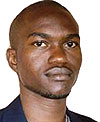Last Sunday, Davis Hillary Ntare, the winner of the Tusker Project Fame 4, was crowned. Davis from Uganda walked away with Ksh5 million after he beat off stiff competition from the comic Peter J Msechu of Tanzania and two Kenyans, Steve Nyabwa and Amileena Mwenesi.


Last Sunday, Davis Hillary Ntare, the winner of the Tusker Project Fame 4, was crowned. Davis from Uganda walked away with Ksh5 million after he beat off stiff competition from the comic Peter J Msechu of Tanzania and two Kenyans, Steve Nyabwa and Amileena Mwenesi.
During the show, Dr. Mitch, the Master of Ceremony asked Tanzanian artist Matonya a question in English and he replied in Swahili which Mitch appeared not to understand.
One thing was clear though, Mitch did not understand Swahili but Matonya understood English but just decided to use Swahili which is considered to be the lingua franca of the East African region and beyond.
It was very refreshing to find out that Rwanda Television airs basic Swahili lessons on Sundays with repeats on Mondays. The Swahili language is mostly used in Tanzania and Kenya. In Uganda, its development has, for ages, been stifled by the strength of Luganda and the negative attitude it gained ,thanks to the civil wars of the 70s and early 80s—an era where Swahili speaking military men and thugs dominated communities.
The use of Swahili in Rwanda and Burundi is quite significant but not widespread. It is largely used at the very basic level with most grammatical rules ignored. Apart from those who lived in Tanzania or Kenya during the troubling times of Rwanda and Burundi, many simply speak very basic Swahili.
I, therefore, commend the management of Rwanda Television for appreciating the importance of Swahili language, especially now that Rwanda is officially part of the East African Community. I was also impressed with the professional way in which the lessons are being delivered.
Although Mwalimu often made some explanations in Kinyarwanda, he also uses English to make things clearer for those whose Kinyarwanda is not sufficient.
In the same light, the French Embassy, through the recently reopened Centre d’echanges culturels Franco-Rwandais (French cultural centre) kicked off an intensive French language programme for adults and children. With the centre still undergoing renovations, the lessons are currently being conducted from Ecole St. Antoine Exupery in Kiyovu.
My research about the French lessons revealed something quite interesting. The majority of the people who registered for the lessons are not Rwandans but foreigners from countries like USA, South Korea, South Africa and Holland!
One may, therefore, conclude that many Rwandans perceive French to be a ‘useless’ language at this time when the country has embraced the English language.
But nothing could be farther from the truth. There is no useless language in the world and the country’s official language policy does not discourage anyone from learning a new language.
Language is a tool of communication and, therefore, there is no way a language can be deemed useless unless it has no existing speakers. Being able to speak more than one international language is very advantageous and can be the route to a big job with a multinational company or NGOs, including the UN system.
Some people are trying to learn Mandarin (Chinese) due to China’s growing influence. In the US; Spanish is more popular than ever due to the growing Latino presence.
Some people keep talking about the declining usage of French and influence of France as a reason for not learning the language but they forget that it is still considered as one of the six UN international languages, and this will probably not change any time soon.
Learning any language is never a waste of time, whether the language is French, Swahili or even Kinyarwanda. This is because one day you may find yourself in need of communication and the only viable language may be the one you shunned in the past.
Don’t you just envy people who are able to speak more than Kinyarwanda and English? I honestly do. And I wish more people would make an effort to learn Swahili at least, so that we can easily communicate with our EAC brothers and sisters.


